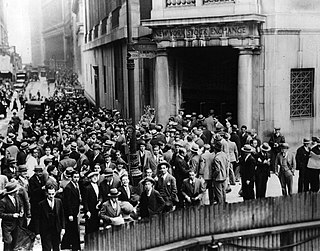Related Research Articles

Bed Bath & Beyond was an American big-box retail chain specializing in housewares, furniture, and specialty items. Headquartered in Union, New Jersey, the chain operated stores in the United States and Canada, and was once counted among the Fortune 500 and the Forbes Global 2000. The chain filed for Chapter 11 bankruptcy in April 2023 and liquidated all of its remaining stores, with the last closing on July 30, 2023. Following the retail chain's liquidation, its name was adopted by online retailer Overstock.com, which acquired Bed Bath and Beyond's trademarks in a bankruptcy auction. The name is also still used by the chain's former Mexican division which is now independent.

Duane Reade Inc. is a chain of pharmacy and convenience stores owned by Walgreens Boots Alliance. Its stores are primarily in New York in addition to in New Jersey. They are known for high-volume and small store layouts in densely populated Manhattan locations. In 2012, the company headquarters moved to 40 Wall Street in Lower Manhattan which is the location of its newest flagship store.

Big Lots Stores, Inc. is an American discount retail chain, specializing in the sale of closeout and overstock merchandise. Founded in 1967 as Consolidated Stores, the chain is headquartered in Columbus, Ohio, and includes over 900 locations across the United States.

Party City Holdco Inc. is an American chain of party stores founded in 1986 by Steve Mandell in East Hanover, New Jersey. The company's headquarters are in Woodcliff Lake, New Jersey.

McCrory Stores or J.G. McCrory's was a chain of five and dime stores in the United States based in York, Pennsylvania. The stores typically sold shoes, clothing, housewares, fabrics, penny candy, toys, cosmetics, and often included a lunch counter or snack bar.

Rite Aid Corporation is an American drugstore chain based in Philadelphia, Pennsylvania. It was founded in 1962 in Scranton, Pennsylvania, by Alex Grass under the name Thrift D Discount Center. It is the third-largest drugstore chain in the United States, with roughly 1,250 stores in 15 U.S. states, primarily on the East and West coasts.

Grand Union Supermarkets, later known as Grand Union Family Markets and often referred to simply as Grand Union, is an American chain of grocery stores that does business in upstate New York and Vermont, and used to do business throughout most of the northeastern United States. It operated stores in other areas of the country, including the midwestern and southeastern states, and internationally in the Caribbean and Canada. The company was founded and headquartered in Scranton, Pennsylvania, and moved to Brooklyn, New York, in the early 20th century. Grand Union moved again to Elmwood Park, New Jersey, and finally to Wayne, New Jersey, before the company was forced into Chapter 7 bankruptcy in 2001 and sold to C&S Wholesale Grocers.

Brentano's was an American bookstore chain with numerous locations in the United States.

Stein Mart is an American discount men's and women's online retailer & former department store chain based in Jacksonville, Florida. Stein Mart had locations primarily in the Southeast, Texas, and California. Stein Mart stores sold recent trends in clothing for both men and women. Additionally, home decor, accessories, and shoes were all available at discounted prices.

The Mills at Jersey Gardens, originally and also still colloquially called Jersey Gardens, is a two-level indoor outlet mall in Elizabeth, New Jersey. The mall opened on October 21, 1999, and is the largest outlet mall in New Jersey, and much closer to New York City than its largest outlet mall competitor, Woodbury Common.

Kroch's and Brentano's was the largest bookstore in Chicago, and at one time it was the largest privately owned bookstore chain in the United States. The store and the chain were formed in 1954 through the merger of the separate Kroch's bookstore with the former Chicago branch of the New York-based Brentano's bookstore. The chain was closed in 1995 after suffering financial losses from increased competition.

The Marbridge Building is an office building at 1328 Broadway, on the east side of Sixth Avenue between 34th and 35th Streets in Herald Square, Manhattan, New York City. It opened in 1909, an 11-story structure, utilized in part by men's clothier Rogers Peet. Until October 1910 it stood opposite the Alpine apartment house, which was at the northeast corner of Broadway and 33rd Street. The Alpine and old stores between 33rd and 34th Streets were demolished to make room for the $5,000,000 Hotel McAlpin near the end of 1910. On the other side of Broadway were located the Macy's Herald Square and Saks Incorporated stores, with the Gimbels store just below.
Davega Stores was a consumer durables, appliance, sporting goods, and apparel chain which operated 27 stores in the metropolitan New York City area in 1954.

Dorb the Chemist, Inc. was a pharmaceutical chain which was based in the Murray Hill section of Manhattan, New York. The business thrived between 1926 and 1932. Started by chemist/pharmacist Abraham Dorb, the company is noteworthy because of its being an example of a firm which lost its vitality because of the Great Depression. It is also significant in the transition of Murray Hill from a social center of New York City to one which was more commercial in its nature. Dorb the Chemist, Inc., had five locations in the greater New York City and planned twenty more stores, prior to the onset of hard times in the 1930s.
The Associated Telephone Utilities Company was a Wisconsin-based power company that went bankrupt in 1933, during the Great Depression. Prior to the Depression, the utility was a prominent player in the electrical power business in the Midwestern United States. An appeal by receivers appointed for the Associated Telephone Utilities Company was filed around April 1933, contesting the bankruptcy of the utility, and it was reorganized in 1934 as General Telephone. A chancellor in a court of chancery permitted the petition to be filed in United States District Court.
Hills Supermarkets, owned by H. Frederick Hill, was a New York based grocery store chain which was popular in the 1960s. In May 1977 it was sold as a subdivision of Pueblo International Inc., to Pantry Pride.
Bellcamp Stores operated a store chain which sold Kaufmann's hats in forty-one stores in sixteen states in the 1930s. Benjamin H. Kaufmann was president of the business.
Sears Holdings Corporation was an American holding company headquartered in Hoffman Estates, Illinois. It was the parent company of the chain stores Kmart and Sears and was founded after the former purchased the latter in 2005. It was the 20th-largest retailing company in the United States in 2015. It filed for Chapter 11 bankruptcy on October 15, 2018, and sold its assets to ESL Investments in 2019. The new owner moved Sears assets to its newly formed subsidiary Transformco.

Crumbs Bake Shop is a bakery chain headquartered in New York City. Founded in 2003 as a small mom-and-pop style bakery on the Upper West Side of Manhattan by Mia & Jason Bauer, the company expanded to 79 locations in ten states and Washington, D.C.